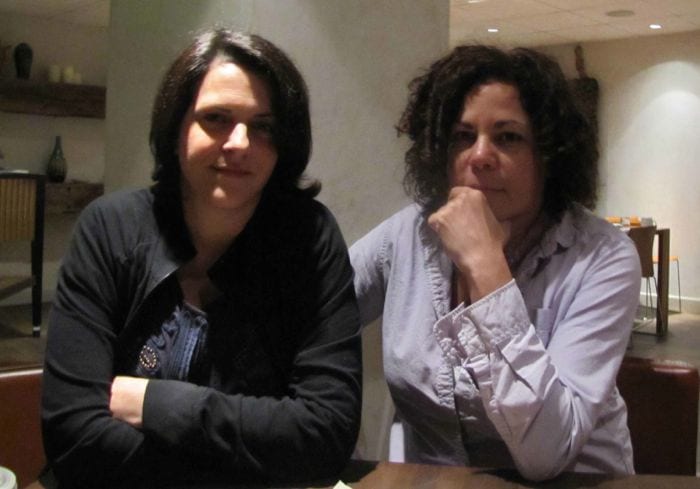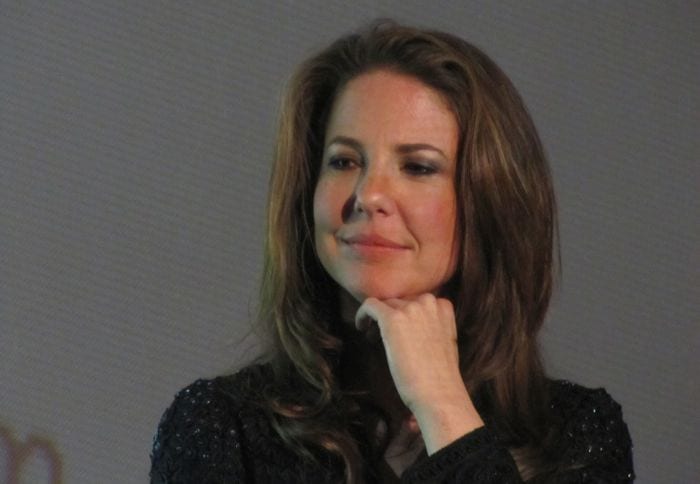Interview with Stacie Passon and Rose Troche, director and producer of Concussion
Interview by Moira Sullivan
Developmental Editing, Copy Editing, and Posting by Alexandra Hidalgo
This review is part of our triple feature on the film Concussion. Please check out our interview with composer Barb Morrison and Moira Sullivan’s review of the film.
In June, director Stacie Passon and producer Rose Troche sat down to discuss Concussion with me before the opening night at the Frameline Film Festival in San Francisco and both were excited about the coming evening. We spoke about the film, gay marriage, and how Concussion opens up a discussion about relationships and about choices. We also discussed the style of the film and their collaborative process as director and producer.
How does it feel to be here at the Castro with your film Concussion on the opening the festival?
STACIE Empowering, triumphant, amazing. A miracle.
ROSE Those are really good words it feels like—
STACIE —awesome joyous.
ROSE I think it’s lovely, weirdly. It’s what I wanted for the film ever since we started it. So for me I guess it’s a little personal but it feels kinda right.
STACIE Why is it personal?
ROSE Because 19 years ago Go Fish opened the festival and there’s something about Concussion that feels like, even though it’s such a wildly ridiculously more accomplished first film than Go Fish was, it feels like a continuation of a story of what our lives are, as if they [the characters in Go Fish] had gotten married. Perhaps it could have been what happens to these relationships 20 years down the road, so it’s interesting.
STACIE I am sort of living Rose’s life out that she has been living for a while. I feel like I’m Judy Garland – you’re James Mason, I’m Barbra Streisand – you’re Kris Kristofferson.
How about Gena Rowlands and John Cassavetes?
ROSE I am definitely Cassavetes, say no more.
STACIE I definitely need to be Gena Rowlands because I know how to blow my top.
ROSE And I just drink that away. So that’s perfect.
OK we got a wrap on that! The character that interested me very much is Kate, who we don’t see very much in the film and it’s really powerful to hear her say at one point in the film that she is not interested in anyone. So what went into the making of this character?
STACIE Hmm… you know Kate is hard to define in many ways because she was very sympathetic. We wanted to show that there were a lot of facets to her: she was a little punishing, she didn’t want to hear any problems, she wanted to get on with life. She was leading this not realistic kind of life just seeing herself, not acknowledging her surroundings.
ROSE Kate just kind of got there: “I’ve got the kids. I’ve got the wife. I’ve got the house. I’ve got there. And now I’m going to be in my life.”
STACIE and ROSE: And Abby can be anything.
ROSE But you know—task complete.
What do you think about gay marriage?
STACIE We’re all for it.
ROSE We are all for it. This is a season of gay marriage for me; I go to another gay marriage on Sunday. I went to one last Saturday.
STACIE I can’t imagine wanting to get married. Why would you want to take away your identity, your freedom? The fact that we have made marriage so linked to stability in our culture, you cannot give away [deny] 1100 rights that you have to be resourceful and go around and pay more for separately, so for me gay marriage or any other kind of legal institution, we just need the right.
I don’t know much about marriage to begin with, gay or otherwise. We want to talk about what relationships are, and what are the parameters of a working relationship, and Concussion is a nice discussion; it’s radical in terms of what Abby does, about what she does about her disillusionment in her marriage.
ROSE We both talked about this before, that the great thing about homosexuals getting married and the thing you would hope that there is a rebellion, a gene that does something like [Rose makes a beeping sound]. If this were a model, a bank investment and it failed that many times, no one would invest in that bank anymore. They would say that’s broken and marriage on some level is kind of broken as an institution. For me, I support it in terms of how we can radicalize marriage, and I’m not talking about opening it up, but there could be something that what is brought to it, so that perhaps it would evolve the nature of marriage. That would be really fucking cool.
STACIE Marriage is an economic prison in many ways; it wasn’t that you wanted to be together to raise your children together because you are good for each other.
ROSE You want to be each other’s person.
STACIE I love when you say that. That’s an amazing thing. People fight for many reasons in marriage. The big reasons are money and sex and when sex is no longer available you are in an economic prison and it always goes down [hill], and I think that is the model that’s broken. And I think the movie speaks to that response.
Certainly for Abby her world opens up, and it definitely opens up for Kate as well, who finds she wants to do more things that she ever did previously.
STACIE You picked up on that. Thank you!
Within the parameters of that relationship nothing was ever discussed. Who knows what agreement they had before?
ROSE They built something together.
STACIE Abby’s either on her way out or on her way back in or she will continue hooking and all of the choices will be fine, but I think the central question of the film is, “ I belong to only you but you don’t want me,” and that is where the film ends for me—that is the resolution and acknowledgment of the question in 93 minutes. You don’t want to know much more than that. That’s the question and they brought it up.
The film for a first feature is very slick and well made with excellent camera work and shots. Did you work with the director of photography on planning the whole mise en scène?
STACIE Yes we got the look that we thought was appropriate for the characters; we worked with natural light, we worked with understanding what those rooms really were—the two different locations: the house which is very open, and the loft which is very heaven-like and freeing.
Rose was very instrumental in being the collaborator for the film—that contributed to the accomplishment of the film. She really gave me some amazing things to think about. The decisions are mine, as she will always say.
ROSE That’s right.
STACIE To have her as a creative producer—I love collaboration. You need people to work with, you need them to back your work and ask what are you trying to say about her [a character]. And that’s pretty much it.
ROSE Stacie having been the business on the commercial side wasn’t a stranger to [film production] or wasn’t wishy-washy. That is why we were done early. We were done. The wonderful part of collaboration, and you learn this with Stacie, is that you learn things. It’s always wonderful to work together.
Well, thanks for a very good collaborative effort and we’re happy to have the film in San Francisco
ROSE and STACIE Thanks for having us.
If you want to read more about Concussion, check our interview with composer Barb Morrison and Moira Sullivan’s review of the film. You can also visit Moira’s profile and the film’s website.


